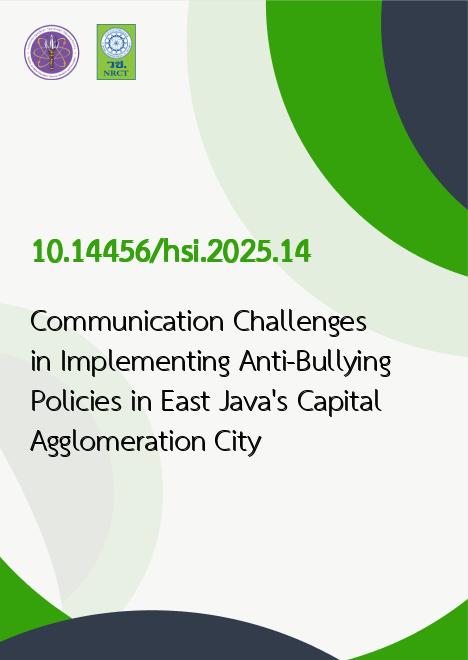
|
Communication Challenges in Implementing Anti-Bullying Policies in East Java’s Capital Agglomeration City |
|---|---|
| รหัสดีโอไอ | |
| Creator | Andra Pratama Juliyanto |
| Title | Communication Challenges in Implementing Anti-Bullying Policies in East Java’s Capital Agglomeration City |
| Contributor | Xenia R. Emperador-Garnace |
| Publisher | สถาบันวิจัยและพัฒนา มหาวิทยาลัยกาฬสินธุ์ |
| Publication Year | 2568 |
| Journal Title | วารสารมนุษยศาสตร์ สังคมศาสตร์ และนวัตกรรม มหาวิทยาลัยกาฬสินธุ์ |
| Journal Vol. | 4 |
| Journal No. | 1 |
| Page no. | 190-209 |
| Keyword | Anti-Bullying Policy, Collaborative Governance, Stakeholder Engagement, Communication Challenges, Public Policy in Education |
| URL Website | https://so02.tci-thaijo.org/index.php/hsi_01/article/view/278302 |
| Website title | วารสารมนุษยศาสตร์ สังคมศาสตร์ และนวัตกรรม มหาวิทยาลัยกาฬสินธุ์ |
| ISSN | ISSN 2821-9635 (Online) |
| Abstract | This research consists of two main purposes: 1) to examine stakeholder interactions, power dynamics, and communication strategies in the implementation of anti-bullying policies in Sidoarjo Regency, East Java, 2) to identify gaps in the current communication and governance frameworks and provide actionable recommendations to strengthen the implementation process and enhance the effectiveness of anti-bullying initiatives. Using qualitative methods and thematic analysis, data were gathered from 22 respondents, including school principals, teachers, and NGO representatives involved in the initiative. Semi-structured interviews and document analysis were used as primary tools for data collection. The results of the research were found: 1) Stakeholder interactions in Sidoarjo’s anti-bullying policy implementation are characterized by informal coordination, limited trust, and communication dominated by top-down directives. Intermediary actors like INOVASI and UMSIDA bridge national and local levels, but feedback mechanisms remain weak. 2) The research identified gaps such as unclear role distribution, sectoral egos, digital disparities, and culturally mismatched messaging. Recommendations include establishing a district-level coordination task force, integrating ICT tools, engaging religious leaders, and developing culturally sensitive, localized communication strategies with structured, inclusive feedback loops for adaptive governance. Based on these findings, the study recommends strengthening formal communication channels, encouraging inclusive participation from all stakeholders, expanding digital infrastructure in rural areas, and applying culturally responsive communication strategies. In addition, regular professional development for teachers and improved inter-agency coordination are essential to support more effective and sustainable anti-bullying efforts in Sidoarjo Regency. |